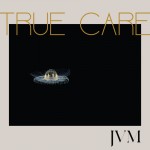James Vincent McMorrow started teasing he had more music coming earlier this year, posting pictures of a countdown hidden on his Twitter bio. The days passed, the numbers turned into morse code, and his profile – which previously followed the light and blue aesthetic of last year’s album We Move – went dark. A new colour scheme, logo, and teases about glowing jellyfish underwater started the gradual build-up towards McMorrow’s fourth album, True Care, set for release this Friday, May 26th via Faction/AllPoints. The first single off the record, also called “True Care,” was released yesterday to give fans a taster of the album. In “True Care,” McMorrow shows a new side to his sound, leaning more towards Bon Iver’s 22, A Million and shredding McMorrow’s previous image as a folk, singer-songwriter, while exploring one of the most meaningful relationships in his life.
Let’s go out for breakfast when you wake
Not hungry now but in a while
I think that all could change
Used to feel so much that it would ache
Now I’ve figured out
the walls surround a holiday
Watch: “True Care” – James Vincent McMorrow
[youtube=https://youtu.be/ZFli7398rd4?t=0s]McMorrow starts the track a cappella, with slight hints of a guitar scratching the surface. His voice alone immediately makes the listener picture a dark room, and kicks off the song with a flood of emotion and powerful storytelling. McMorrow’s skill in painting a picture in the listener’s head, in the first two lines describing what he refers to as the “mundane” on the lyric annotations on Genius, tied with his willingness to be transparent with his feelings (“used to feel so much that it would ache”) shake the listener awake and immediately brings us close to the song and to McMorrow himself.
True care
What does that even mean?
I needed true care
When I was 17
True care
How do you even show?
I needed true care

Next, the beat is introduced along with the instruments that support McMorrow in telling his story. The steady beat comes in the form of claps, giving an additional human element to the song and making it that much more personal but at the same time universal. The narrative itself starts at the age of 17, an age which McMorrow has admitted was difficult for him. On the first verse he asks for “true care” reflecting upon and simultaneously giving voice to his teenage self. His plea also stems from a place of confusion, probably a reflection of his teenage mind, asking “what does that even mean?” and “how do you even show?”
When I was 23 years old
You show me true care then
When you showed up to a house
Where I was drinking by myself
By the door
Spilling liquid on a carpet
That belonged to someone
I didn’t even know
Or care about
Or want to show
My vivid mind
Or tragic dancing
The story resumes six years later, with a particular situation being described by McMorrow for him to illustrate him receiving the “true care” he so longs for throughout the song. This is where the second charater in the story is introduced, this character being his friend and person who supports him, and the rest of the song is addressed towards this person and speaks about their relationship. He has stated this whole verse was taken from an experience he did live through, and the vivid imagery and raw emotion on this verse attest to that – one can clearly picture the situation and feel what he’s feeling.
And on my brightest days
Still duller than your darkest days
Impossible for me to say
How anyone
Deserves your true care
I’m uncomfortable
With being so uncomfortable
You let me be unreasonable
With everyone
Show me true care

At what can be considered the song’s chorus, McMorrow goes on to show his admiration for the person who takes care of him. His voice multiplies, creating harmonies that entice you and remind you of the start of the song. “Impossible for me to say/ How anyone/ Deserves your true care” shows that he does not even think he is deserving of such a kind person in his life, looking out for him for years and in every situation. McMorrow provides us with a mirror to his inner feelings in lines like “on my brightest days/Still duller than your darkest days” and “I’m uncomfortable/ With being so uncomfortable,” where he highlights the difference between him and the person who serves as his support system while also acknowledging his dissatisfaction with the situations he finds himself in. There is also an element of honesty and truth in this relationship, especially when he says “You let me be unreasonable/With everyone” as if he could only be his true self and relax when his friend is around.
And on my brightest days
Still duller than your darkest days
Impossible for me to say
How anyone
Deserves your true care
And in front of all
Our friends are so responsible
You let me be unreasonable
With everyone
Show me true care

On the last rendition of the chorus, nothing is changed but two lines – “And in front of all/Our friends are so responsible,” another situation in which McMorrow shows how much he feels out of place even amongst his friends. This highlights even further the significance of McMorrow’s relationship with the person who he’s singing to.
Not long after James Vincent McMorrow appeared to bare his soul on We Move, he returns with “True Care” to show us he has more stories to tell. The lead single off his new album gives fans a taster of his sound’s new direction as well as the emotions he will explore on the new record. Writing a song about someone else’s support and how necessary it is to you is not only incredibly beautiful, but also puts the singer/songwriter in a terribly vulnerable position – however McMorrow’s attempt is genuine, honest, and incredibly raw. Singing about his fragile moments, he shows incredible strength and confidence as a person and artist, and leaves everyone anxious to hear what his new album, True Care, will bring.
— — — —

Connect with James Vincent McMorrow on
Twitter, Instagram, Facebook
Discover new music on Atwood Magazine
cover © James Vincent McMorrow








